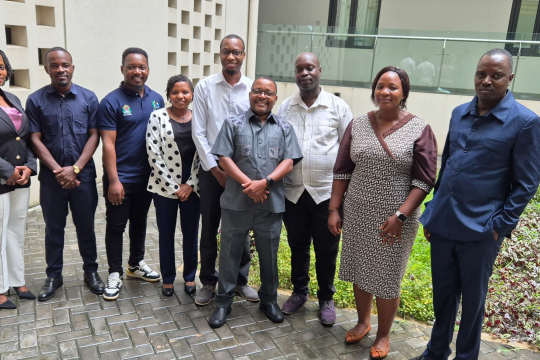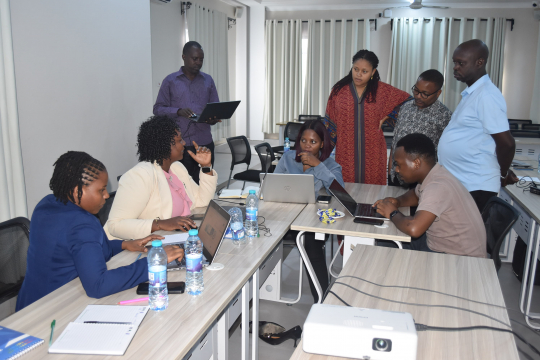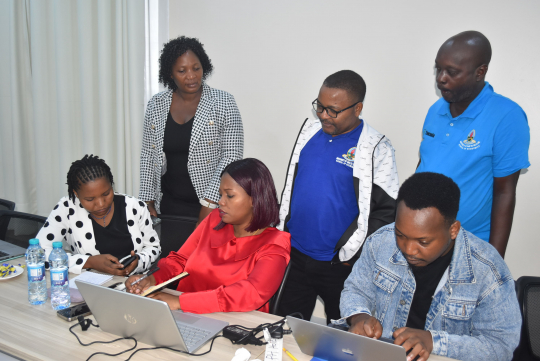EfD Tanzania, in collaboration with EfD’s Global Hub, officially launched the 2025 cohort of Inclusive Green Economy (IGE) Fellows in a vibrant event held on April 17, 2025, at the University of Dar es Salaam. This launch marked the beginning of an intensive capacity-building journey to empower public officials to lead transformative green policy reforms across Tanzania.
Following the launch, the first training workshop took place from April 28–29, 2025, in Morogoro. This event introduced the fellows to the foundational principles of inclusive green economy, equipping them with the knowledge, tools, and networks to integrate environmental sustainability and social inclusion into national development strategies.
“We are delighted to support a new generation of policymakers who are not only champions of economic growth but also guardians of environmental sustainability and social inclusion,” said Dr. Martin Chegere, Acting Director of EfD Tanzania.
The IGE fellowship experience: A transformative learning journey
The training in Morogoro set the tone for the IGE Fellowship experience, focusing on key environmental and economic policy themes relevant to Tanzania’s development agenda. Led by distinguished economist Prof. Thomas Sterner from the University of Gothenburg, fellows explored complex topics such as environmental degradation, market-based instruments, and the use of economic tools to promote climate-smart agriculture and sustainable land use.
Complementing this were practical sessions facilitated by experts from Ethiopia, Rwanda, and Uganda, who shared evidence-based insights from Sub-Saharan Africa on fostering just, low-carbon transitions in agriculture and land management. These discussions deepened the fellows’ understanding of the intersection between economic development, environmental protection, and social equity.
The workshop was a powerful start to a year-long learning journey that encourages fellows to think critically, collaborate across sectors, and develop practical policy solutions for inclusive and sustainable growth.
Voices from the Fellows: Insights and Aspirations
The 2025 IGE cohort comprises mid-career professionals from critical ministries including Finance, Agriculture, Livestock and Fisheries, and the Vice President’s Office – Environment Division. Their reflections underscore the program’s practical value:
Norbert Zavery Mwitta, Economist, Ministry of Finance:
“The Ministry of Finance plays a central role in mobilizing resources for sustainable development. Through IGE, I aim to deepen my understanding of how climate-smart agriculture and sustainable land use can be embedded in national budgets and planning frameworks. This program is a timely opportunity to explore how we can attract climate finance while maintaining fiscal sustainability.”
Joseph Jeremiah Onesmo, Ministry of Livestock and Fisheries:
“This training offers practical strategies that can be directly applied in our work. I’m particularly interested in low-carbon livestock systems and how smart land use can support both livelihoods and environmental goals. What I learn here will certainly feed into our ministry’s programs and plans.”
Lusubilo H. Mwakatumbula, Ministry of Agriculture:
“My role in policy development and review is to ensure that our strategies are forward-looking. The IGE program will help me integrate sustainability and innovation into agricultural policymaking—key for food security and economic transformation.”
Dorice Sebastian Muyomba, Ministry of Agriculture:
“As someone involved in environmental auditing and waste management, this program offers crucial insights into how we can make our sanitation and pollution control services greener, more effective, and aligned with inclusive development.”
Suzana Dominiksi Mbilinyi, Vice President’s Office – Environment Division:
“As an agricultural officer focused on protecting natural ecosystems, I believe the IGE fellowship will enhance my technical and policy skills in soil and water conservation, reducing pollution, and implementing environmental laws.”
Why the IGE Program Matters for Tanzania
Tanzania, like many countries in the Global South, faces the urgent task of balancing economic growth with environmental sustainability and social equity. The IGE program addresses this challenge by nurturing a new generation of civil servants equipped to:
- Bridge the gap between science and policy
- Strengthen policy coherence across ministries
- Facilitate a just transition to a green economy
- Enhance institutional readiness for climate finance and green investments
- Promote inter-ministerial collaboration on cross-cutting sustainability issues
EfD Tanzania’s commitment to this initiative aligns with national priorities, including the Five-Year Development Plan III, the National Environmental Master Plan, and the Climate-Smart Agriculture Framework.
Anticipated impact and way forward
Throughout 2025, IGE Fellows will engage in additional workshops, peer learning sessions, and collaborative policy transformation projects. Their journey will culminate in regional events showcasing real-world applications of inclusive green economy principles.
The IGE Fellowship in Tanzania demonstrates how strategic investment in human capital and intersectoral learning can accelerate the country’s transition toward a greener, more inclusive, and resilient development pathway.
By Salvatory


